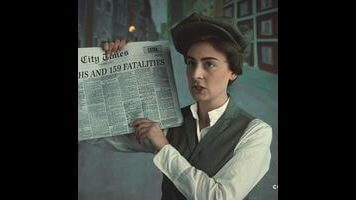Eric Edelstein’s account of the close working relationship between FDR and Winston Churchill has stronger relationship dynamics and emotions to work with, making it an overall more engaging story. Edelstein makes it very clear that these men were genuinely friends, making them seem like real people rather than just looming historical figures. But he also makes it clear that that friendship had huge stakes attached to it. He manages to tell a war story that isn’t fixated on war so much as this central relationship. And Louie Anderson was born to play Churchill, bringing vitality to his performance and expertly finding the humor in Edelstein’s words.
But what really takes “The Roosevelts” to the next level is its final segment. As an intimate account of a beautiful and emotional relationship between two powerful women, it embodies a lot of the same strengths as Tymberlee Hill’s retelling of Ella Fitzgerald and Marilyn Monroe’s friendship a couple weeks ago. I didn’t love how Eleanor Roosevelt was portrayed in Edelstein’s retelling. She literally only appears there to tell the men to take a break from working to go to sleep, but in real life, Eleanor Roosevelt rarely took a break herself. I don’t think Edelstein intentionally made her seem like a nagging wife, but it just wasn’t a great representation of her character. But this closing Eleanor-centric story made up for that, portraying her as the complicated, smart, ambitious, hard-working woman she was. And who better to tell it than Paget Brewster? Brewster is one of my favorite Drunk History narrators, and she does not disappoint in season four.
Part of Brewster’s allure as a reteller is her sheer intensity. Right off the bat, she brings her not-fucking-around attitude to the show, chastising Waters for not cheersing properly. Then she dives right into her story of how Eleanor Roosevelt befriended a 25-year-old soviet sniper named Lyudmila Pavlichenko and worked together to build American support for the war. Eleanor and Pavlichenko were both victims of sexism in the press, and both rose above their stations, achieving far more than anyone expected from them. (In the case of Pavlichenko, that meant she killed hundreds of fascist operatives.) Brewster’s intensity underscores just how badass and relentless these two women were. “What the fuck?” she spits out as Pavlichenko’s response to journalists asking why she didn’t wear blush and why her uniform is unflattering. And the casting decisions in this segment are especially apt. Busy Philipps is an infectious and layered Eleanor, and the tiny, fierce Mae Whitman matches Brewster’s intensity brilliantly. Brewster’s wording of Pavlichenko’s monologue putting American media in its place packs a punch, and Whitman’s interpretation ensures that punch lands right on target. They make a great team.
And then in the final act of Brewster’s story, I found myself crying. I wasn’t crying because of laughter. I can’t remember the last time I laughed to the point of crying about something on television (though it was probably something Nick Miller-related). No, I cried from genuine, complicated emotions. Because Brewster started crying. The narrator who is usually so hard, so zero-bullshit in her attitude has a full-on emotional breakdown over the pure magic of female friendship. Eleanor and Pavlichenko reunite in Russia, but it’s a stifled and cold reunion in the presence of Eleanor’s political minder. But the second the women sneak off to have a moment to themselves, they embrace warmly, overwhelmed to be together again. “It’s just two women, happy to see each other,” Brewster says through tears. “I think it’s really touching.” It is. It’s so simple and yet so real, so full of humanity. Eleanor Roosevelt was a deeply intimate and loving person, though she isn’t often portrayed as such by media. This woman wrote to her closest friends every day, blurred lines between friendship and romance. Brewster—and Philipps and Whitman—capture that woman. Brewster’s emotional response seems so genuine and raw, the kind of moment Drunk History is uniquely positioned to catch. She’s suddenly so vulnerable that she forgets her own rules for cheersing.
Stray observations
- There’s some especially great physical comedy, like Derek Waters getting repeatedly fake-punched at the Harvard-Yale game and Churchill and Hitler shoving each other back and forth in split-screen.
- The use of Battlefield in the FDR/Churchill segment is funny, too, and then it shows up again in the Eleanor/Pavlichenko segment, connecting the worlds.
- “He’s my Brando.” – Waters on James Van Der Beek
- “You are a gentleman, but with just the right amount of bastard.”
- “Coyotes! The coyotes are eating the neighbor’s cat! Well, we gotta wait this out, right?”
- If you want to know more about what I mean when I talk about Eleanor blurring lines between friendship and romance, I highly recommend Googling “Eleanor Roosevelt and Lorena Hickok.”
- In fact, my deep knowledge of Eleanor’s relationship with Lorena makes me think there could have maybe been a little more than friendship going on between Eleanor and Pavlichenko…JUST SAYING.
- “When I was 25, I think I plucked off all my eyebrows and dressed like Prince.”
- Maria Blasucci and Aasha Davis deserve more credit than they get for how hilarious this show is. Just watch Blasucci’s face when Nolan struggles to get through the wording of the newspaper headline following the bloodbath at Hampden Park. She perfectly imitates every sound and sentiment Nolan gives her to work with. Drunk History really comes together because of these finer details.

 Keep scrolling for more great stories.
Keep scrolling for more great stories.
